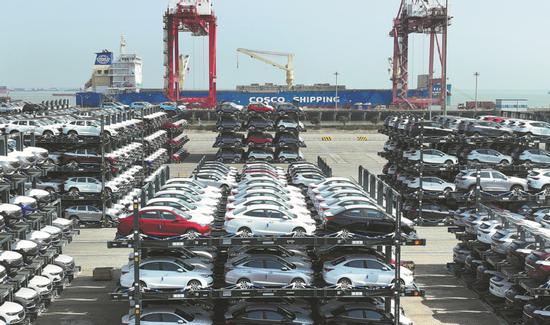 Vehicles from Chinese brands wait to be exported from a port in Suzhou, Jiangsu province. (Photo provided to China Daily) Several former heads of European states have said that China-Europe trade benefits both sides, and expressed hope that the European Union's tariffs on China-made electric vehicles is "temporary" and that the two sides will be able to resolve the issue through negotiations, without hurting trade. They made the remarks on the sidelines of the 2024 Imperial Springs International Forum, held on Thursday in Madrid, Spain. The comments come after the EU finalized a decision in October to place additional tariffs of up to 35.3 percent on Chinese EV imports, even as the Chinese and EU technical teams continued discussions to reach an agreement. The agreement, if reached, would likely include China agreeing to a mutually acceptable export price and volume for its EVs in exchange for the EU removing the tariff hikes. Ivo Josipovic, a former president of Croatia, said the tariffs on China-made EVs were a result of the economic crisis in Europe and that the EU was trying to protect its industry and jobs. "I think that we will see that restrictions are not leading to the best result. I hope that the tariffs are a temporary approach and win-win trade policy can be good for both sides," said Josipovic, who was in office as Croatian president from 2010 to 2015. According to him, huge economies like China and Europe benefit from fair cooperation and there is a future with no restrictions for any side. However, to promote cooperative projects and activities, it is important to have similar standards for different measures like customs rules. Valdis Zatlers, who was president of Latvia from 2007 to 2011, said the tariffs were a tool for the EU in the process of adapting to the new situation of trading with China, especially in the automobile sector. "But if we want to go further with our economic relations... the tariffs are not forever," Zatlers said, adding that he would like to see the outcome of negotiations between China and the EU on this issue. Esko Aho, who served as prime minister of Finland from 1991 to 1995, said he witnessed China's opening-up in the 1990s and understood the nation believing that it would lag behind if it is not able to get access to the global market and the best technologies in the world. "I think it is very important to keep this in mind. For sure, China is in a different phase now and China's role has changed, but I think this basic approach can remain the same," Aho said. Aho said despite the issues surroundings market access and equal treatment of companies in China and Europe having always been present, the two sides have found ways to expand trade. "It has been beneficial for both. Europe has benefited from Chinese products coming to the market, and China has benefited a lot as well because of European investment in China and imports of certain critical materials or parts from Europe," Aho said. Wolfgang Schussel, who was chancellor of Austria from 2000 to 2007, said in his personal capacity that he was against tariffs on Chinese EVs and pointed out that a lot of European companies are producing EVs in China and selling them in Europe. Schussel also noted that "everybody is talking about this problem", but the trade in EVs only represents a "tiny" proportion of the trade between China and Europe. "The EU is absolutely prepared to negotiate and I think the Chinese counterparts are absolutely professional negotiators as well," he said. "Let's find a deal that does not damage the trade as such." |
广告合作(Contact Us)|关于我们|小黑屋|手机版|Archiver|加拿大密西沙加华人网
GMT-5, 2025-1-22 01:53